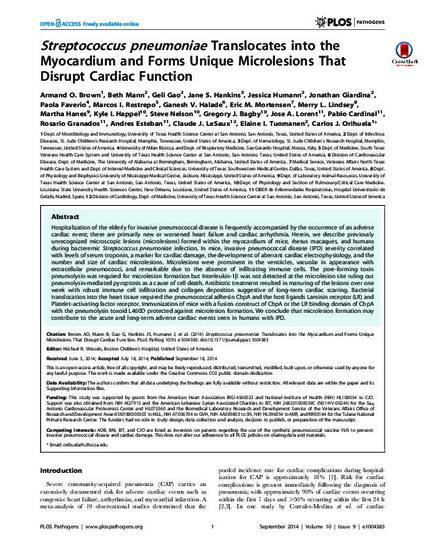
Hospitalization of the elderly for invasive pneumococcal disease is frequently accompanied by the occurrence of an adverse cardiac event; these are primarily new or worsened heart failure and cardiac arrhythmia. Herein, we describe previously unrecognized microscopic lesions (microlesions) formed within the myocardium of mice, rhesus macaques, and humans during bacteremic Streptococcus pneumoniae infection. In mice, invasive pneumococcal disease (IPD) severity correlated with levels of serum troponin, a marker for cardiac damage, the development of aberrant cardiac electrophysiology, and the number and size of cardiac microlesions. Microlesions were prominent in the ventricles, vacuolar in appearance with extracellular pneumococci, and remarkable due to the absence of infiltrating immune cells. The pore-forming toxin pneumolysin was required for microlesion formation but Interleukin-1β was not detected at the microlesion site ruling out pneumolysin-mediated pyroptosis as a cause of cell death. Antibiotic treatment resulted in maturing of the lesions over one week with robust immune cell infiltration and collagen deposition suggestive of long-term cardiac scarring. Bacterial translocation into the heart tissue required the pneumococcal adhesin CbpA and the host ligands Laminin receptor (LR) and Platelet-activating factor receptor. Immunization of mice with a fusion construct of CbpA or the LR binding domain of CbpA with the pneumolysin toxoid L460D protected against microlesion formation. We conclude that microlesion formation may contribute to the acute and long-term adverse cardiac events seen in humans with IPD.
PLoS Pathogens, v. 10, issue 9, art. e1004383
This is an open-access article, free of all copyright, and may be freely reproduced, distributed, transmitted, modified, built upon, or otherwise used by anyone for any lawful purpose. The work is made available under the Creative Commons CC0 public domain dedication.Available at: http://works.bepress.com/ganesh-halade/77/